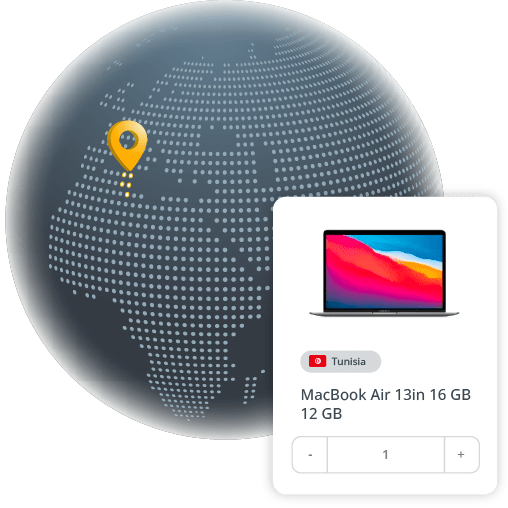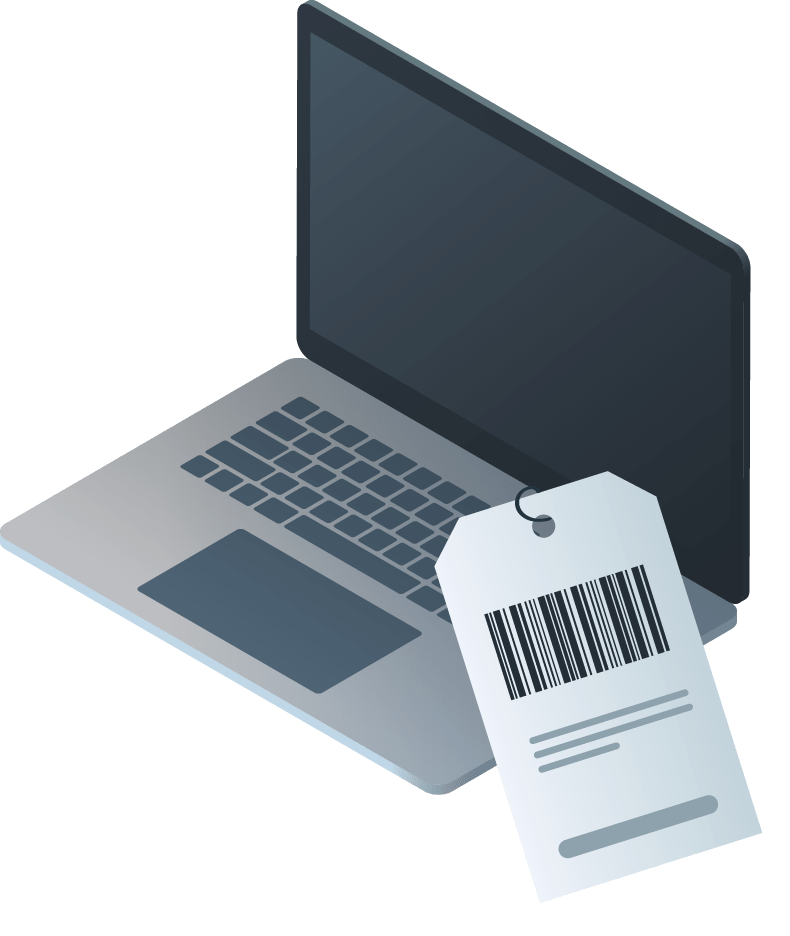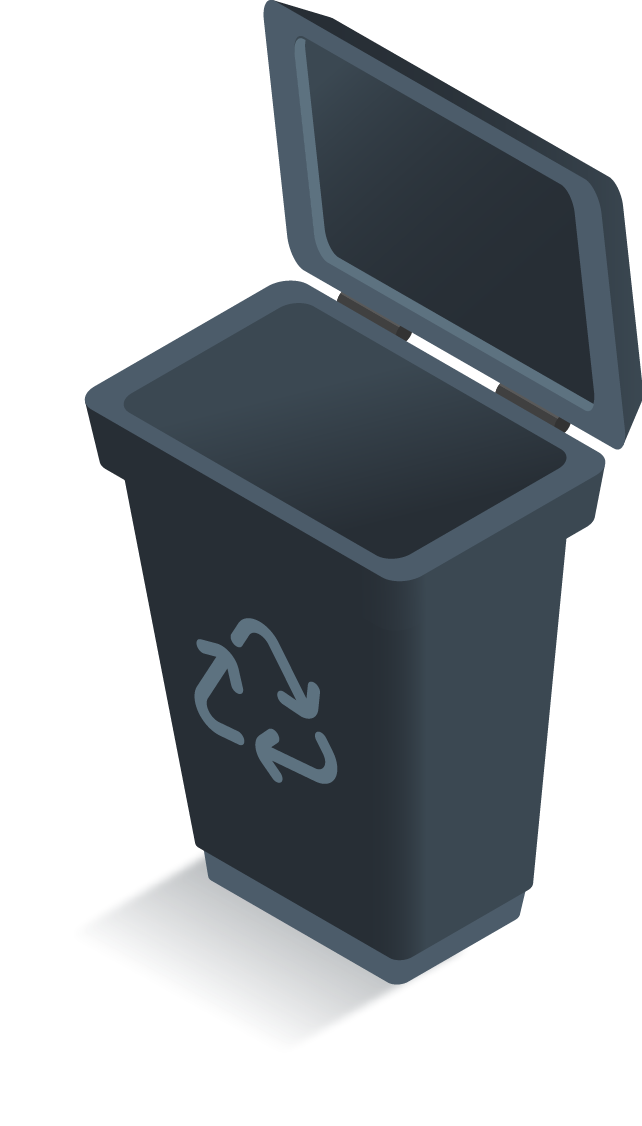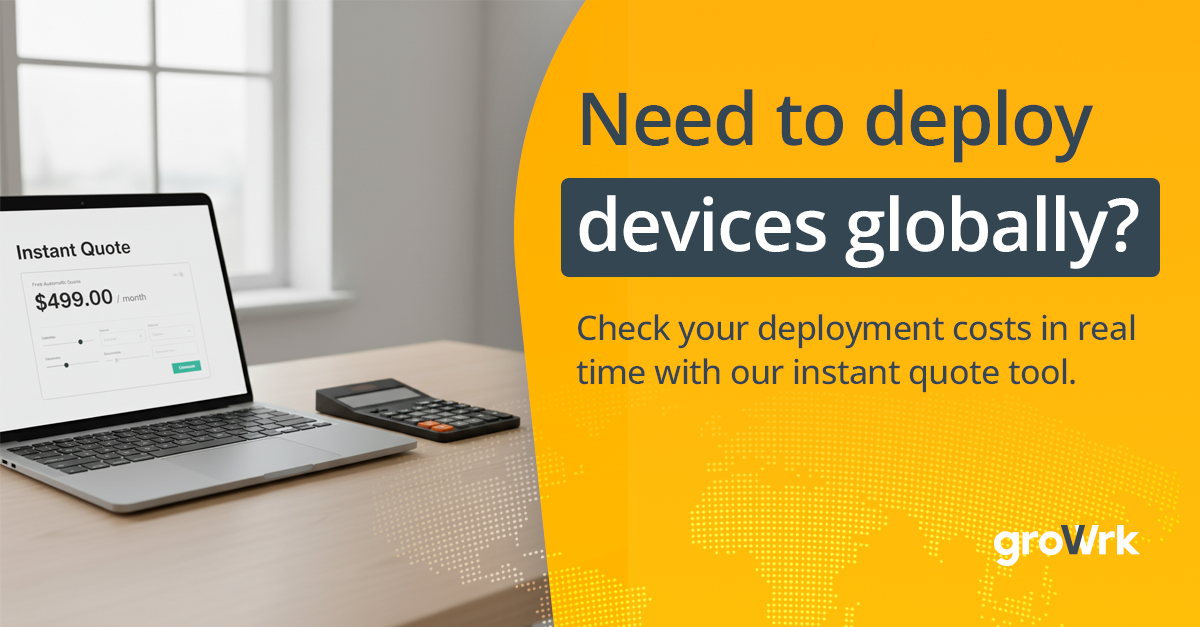How to send IT equipment to Tunisia
Are you looking to send IT equipment to remote teams in Tunisia? At GroWrk, we specialize in simplifying cross-border IT asset management, ensuring seamless delivery of laptops, servers, and other essential devices to Tunisia. From logistics to customs clearance and regulatory compliance, we handle everything so you can focus on business growth.

At a glance
Tunisia is a growing hub for IT and digital transformation in North Africa, with a rapidly evolving tech ecosystem. The country has invested heavily in IT infrastructure, digital education, and software development, making it an attractive destination for IT outsourcing and remote tech teams.
|
CURRENCY Tunisian Dinar (TND) |
OFFICIAL LANGUAGE Arabic (French is widely used in business) |
TIME ZONE GMT+01:00 Central European Time (CET) GMT+01:00 |
|
CUSTOMS DUTY ON ELECTRONICS Typically 10-30% customs duties and 19% VAT |
SHIPPING LEAD TIME 5-12 days (depending on shipping method and customs clearance) |
IT OUTSOURCING MARKET Rapidly growing, with an increasing demand for cloud computing, fintech, and digital transformation services. The market is expected to reach US$271.80 million in 2025. |
Overview of IT operations in Tunisia

Growing IT sector: Tunisia’s IT industry is expanding, particularly in fintech, AI, and cybersecurity, with government support encouraging digitalization and investment in tech startups..
Reliable IT infrastructure: The country has a well-developed fiber network, modern data centers, and expanding cloud computing services that support businesses and international corporations.
Skilled workforce: Tunisia boasts a strong pool of IT professionals skilled in software engineering, network security, and artificial intelligence, making it a strategic location for remote teams.
Regulatory compliance: The country enforces strict data protection laws under the Personal Data Protection Law (Law No. 2004-63), which impacts IT operations and data security practices.
Evolving tech ecosystem: Tunis, Sfax, and Sousse are major tech hubs, home to innovation centers, startup accelerators, and multinational IT firms.
Shipping IT equipment to Tunisia: What you need to know
| Customs regulations |
Tunisia enforces strict customs regulations for the import of IT equipment. Shipments must comply with the Tunisian Customs Authority’s requirements for classification, documentation, and duty payments.
|
| Duties and taxes |
|
| Required documentation |
|
| Import Restrictions |
|
| New vs. Used equipment |
|
| Customs clearance process |
|
| Penalties for non-compliance |
|
Checklist for sending laptops to Tunisia
When shipping laptops to Tunisia, it’s important to follow a few best practices to ensure the process goes smoothly, and your equipment arrives safely and on time. Here are some helpful shipping tips:

Select trusted couriers: Choose reliable couriers such as GroWrk, DHL, UPS, FedEx, or La Poste Tunisienne for international shipping. These carriers offer tracking services and are experienced in navigating Tunisian customs procedures.
Check service levels: Select the appropriate shipping option based on urgency. Express shipping (3-6 days) for high-priority deliveries. Standard shipping (7-14 days) for cost-effective options.
Use high-quality packaging: Secure laptops with sturdy, padded boxes and protective materials like bubble wrap, foam inserts, or air cushions to prevent damage during transit.
Disassemble where possible: If shipping accessories like chargers, docking stations, or monitors, package them separately to prevent damage. Remove detachable components if applicable.
Label clearly: Ensure the recipient’s name, address, and contact details are correctly labeled. Mark the package as "fragile" to encourage careful handling.
Accurate product descriptions: On the commercial invoice, provide a detailed and accurate description of the laptop, including its brand, model, and serial number. Inaccurate descriptions may cause customs delays.
Value declaration: Declare the correct value of the laptop to avoid under- or over-declaring, which could lead to customs inspections or fines. The declared value determines any applicable duties and taxes.
Customs declarations: All international shipments to Tunisia require customs processing. Include: Tunisian Customs Declaration (Déclaration en Douane), commercial invoice, packing list, and Proforma Invoice (if applicable)
Proof of origin: If applicable, include a certificate of origin to benefit from preferential trade agreements, such as the Tunisia–EU Association Agreement, which may reduce customs duties.
Understand import duties & taxes: Laptops are typically subject to 0% customs duty, but subject to VAT at 19%, calculated on the CIF value (Cost + Insurance + Freight). Additional consumption tax or customs handling fees may apply depending on product specifications.
Pre-pay duties and taxes: Some couriers allow for pre-paid duties and taxes to simplify customs clearance and prevent the recipient from facing unexpected charges upon arrival.
Protect against loss or damage: Consider purchasing shipping insurance for high-value laptops to protect against loss, theft, or damage during transit.
Compliance with Tunisian regulations: Laptops with wireless or Bluetooth modules may require approval from the National Frequencies Agency (ANF) or Ministry of ICT for commercial imports.
Use tracking tools: Major couriers provide real-time tracking—monitor shipments closely to anticipate customs clearance updates and delivery progress.
Stay in touch with the recipient: Notify the recipient about the expected delivery timeline, tracking updates, and any customs-related requirements to avoid delays.
Expect weather and seasonal delays: Plan for potential delays during Ramadan, Eid, or national holidays, as well as during the summer heat or winter storms in some regions.
Tunisian domestic delivery options: For final delivery, consider La Poste Tunisienne, Aramex Tunisia, or regional couriers like Rapid-Poste or ChronoPost Tunisia for reliable local distribution.

Average cost of IT Equipment in Tunisia
Laptops (Business Grade):
- Mid-range: TND 3,000 - TND 7,000
- High-end: TND 7,000 - TND 14,000
High-end models such as Apple MacBook Pro, Dell XPS, and Lenovo ThinkPad are priced on the higher end.
Monitors (Business Grade):
- Standard: TND 750 - TND 1,800
- Ultrawide/4K: TND 2,500 - TND 5,000
Monitors from trusted brands like Dell, Samsung, and LG typically range within these prices, with 4K or ultrawide models costing more.
Desktops (Business Grade):
- Standard Desktop PC: TND 1,800 - TND 6,000
- Workstation Desktop (for high-performance tasks): TND 6,000 - TND 18,000+
Prices depend on the brand and specifications, with options from HP, Lenovo, and Apple among the most common.
Printers (Laser):
- Standard Office Printers: TND 700 - TND 1,800
- High-Volume Printers: TND 3,500 - TND 10,000
Leading brands such as HP, Canon, and Brother offer a wide range of models for office environments.
Public holidays & IT work hours to plan your shipment
Key public holidays in Tunisia:
- Independence Day – March 20
- Labor Day – May 1
- Republic Day – July 25
- Revolution Day – January 14
- Eid al-Fitr, Eid al-Adha – Islamic calendar-based holidays
Typical work hours for IT professionals
- Standard workweek:
- The typical workweek is 40 to 45 hours, with standard business hours from 8:00 AM to 5:00 PM, Monday to Friday.
- Many IT companies allow flexible working hours, where employees may start between 7:00 AM and 9:00 AM and finish between 4:00 PM and 6:00 PM, depending on the employer’s policies.
- Employees usually take a lunch break of 30 minutes to 1 hour.
- Overtime regulations:
- Overtime is regulated under Tunisia’s labor laws.
- Employees may not work more than 10 hours of overtime per week.
- Overtime pay is typically 1.5 times the hourly wage on weekdays and double on Sundays and public holidays.
- Some companies offer time-off-in-lieu instead of overtime pay.
What to consider when retrieving IT equipment from employees in Tunisia
| Local delivery and logistics services |
|
| Inventory management |
|
| Logistics challenges for remote locations |
|
| Equipment agreement with employees |
|
How to dispose of IT equipment in Tunisia
E-Waste Recycling:
- Certified E-Waste handlers: Businesses must dispose of IT equipment through registered e-waste recycling providers in compliance with Tunisia’s environmental laws.
- Drop-off recycling centers: Individuals and businesses can drop off outdated IT devices at designated e-waste collection points or certified recycling facilities.
Data Destruction:
- Wipe data completely: Use certified software to erase all stored data to prevent unauthorized access.
- Physical destruction: For highly sensitive data, consider shredding or degaussing hard drives and SSDs.
Repurposing or Donating:
- Support education & communities: Donate working computers to schools, non-profits, or community programs.
- Internal reuse: Older devices can be reassigned for secondary tasks before disposal.
Manufacturer Recycling Programs
- Brands like Dell, HP, and Apple offer take-back programs for safe recycling or refurbishment. These programs ensure that old or used IT equipment does not end up in landfills, helping to reduce environmental impact. Many manufacturers provide incentives, such as discounts on new devices, for customers who return old equipment for proper disposal.

Local IT Outsourcing Solutions in Tunisia
You can streamline your IT logistics and asset management with GroWrk’s comprehensive global solution. Whether it’s shipping equipment or managing IT assets across multiple regions, GroWrk helps you stay compliant and efficient every step of the way. Here’s why GroWrk is the ideal partner for managing your IT assets in Tunisia:

| 1. Wide global coverage |
With operations in over 150 countries, including Tunisia, GroWrk ensures seamless IT equipment deployment for teams, no matter where they are. Our in-depth knowledge of Tunisian regulations guarantees compliance and efficiency tailored to your business needs. |
| 2. End-to-end asset management |
From procurement to deployment, maintenance, and secure disposal, GroWrk manages the full lifecycle of IT assets. This allows businesses to focus on growth while ensuring smooth and secure IT operations. |
| 3. Intuitive platform for easy deployment |
Our centralized platform simplifies IT equipment management by enabling real-time tracking, shipment monitoring, and asset usage insights. This reduces administrative workload and enhances operational efficiency across Tunisian offices. |
| 4. Smooth delivery and equipment retrieval |
GroWrk ensures the smooth delivery of IT equipment to employees throughout Tunisia. We also manage the return of devices from departing employees, making the process cost-effective, streamlined, and hassle-free. |
| 5. Compliance with Tunisian import regulations |
We handle all aspects of IT import compliance, including customs clearance, VAT, and electronic equipment regulations. By aligning with Tunisian customs requirements, GroWrk prevents delays and ensures a smooth supply chain. |
| 6. Efficient repairs and maintenance |
From routine servicing to urgent repairs, we coordinate IT equipment upkeep to minimize downtime. Our expert technicians ensure that devices remain in optimal working condition, allowing employees to stay productive. |
| 7. 24/7 Support for peace of mind |
Our dedicated IT asset management support team is available round-the-clock to assist with IT asset management, logistics, and troubleshooting. With GroWrk, businesses in Tunisia can rely on expert support anytime. |
Procure, configure, and deploy your IT devices from one platform


